中考英语专题复习:冠词课件(49张PPT)
文档属性
| 名称 | 中考英语专题复习:冠词课件(49张PPT) |

|
|
| 格式 | zip | ||
| 文件大小 | 3.2MB | ||
| 资源类型 | 教案 | ||
| 版本资源 | 通用版 | ||
| 科目 | 英语 | ||
| 更新时间 | 2018-11-04 13:21:42 | ||
图片预览

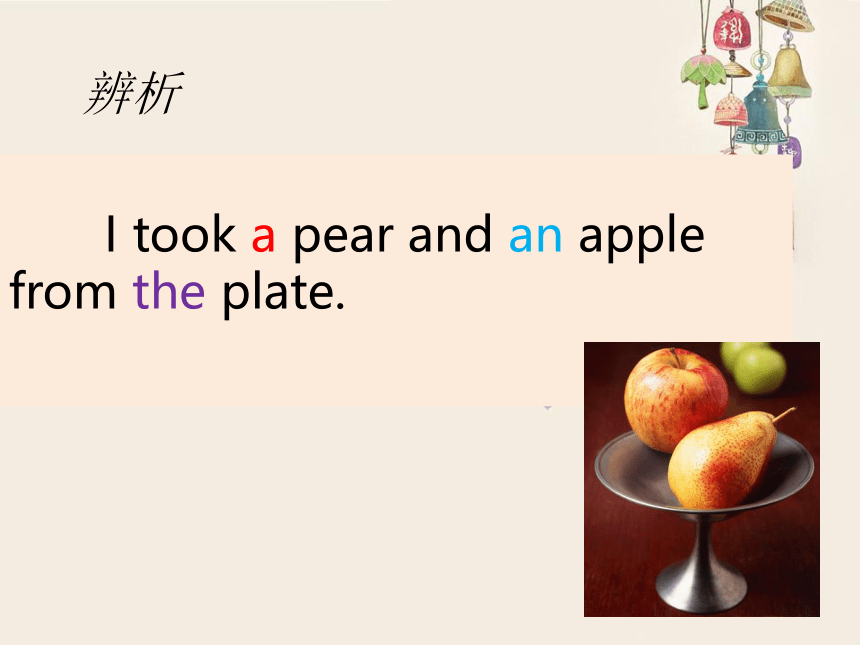
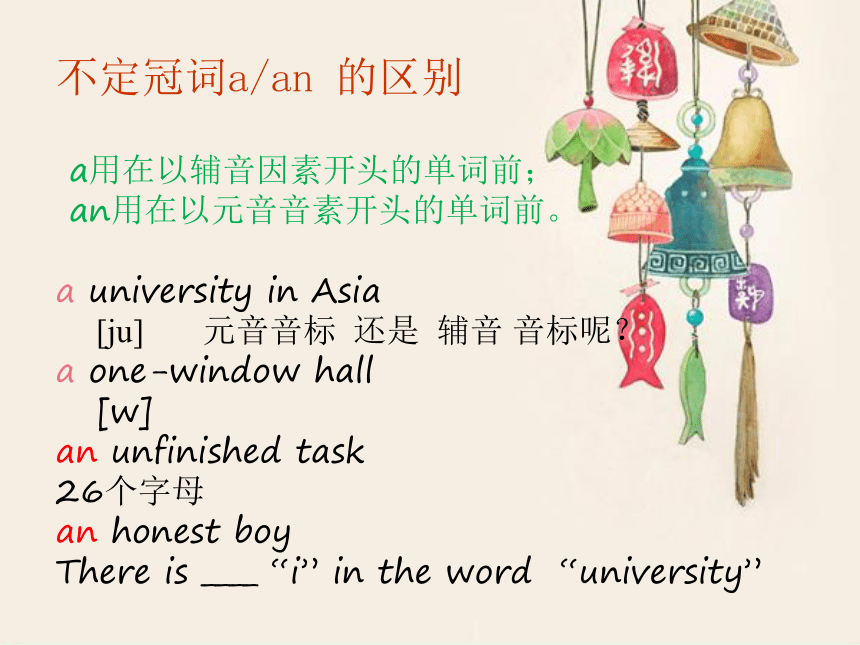
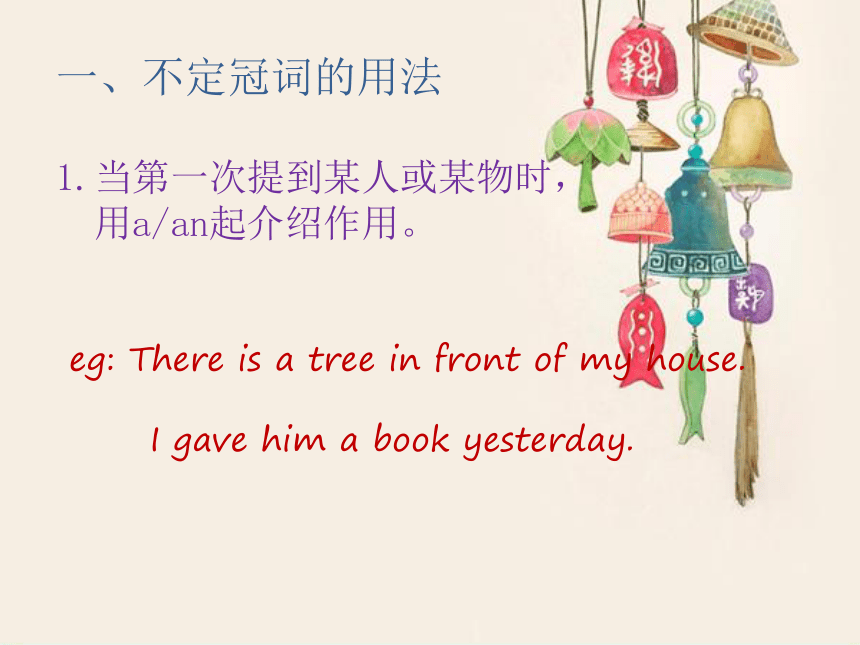
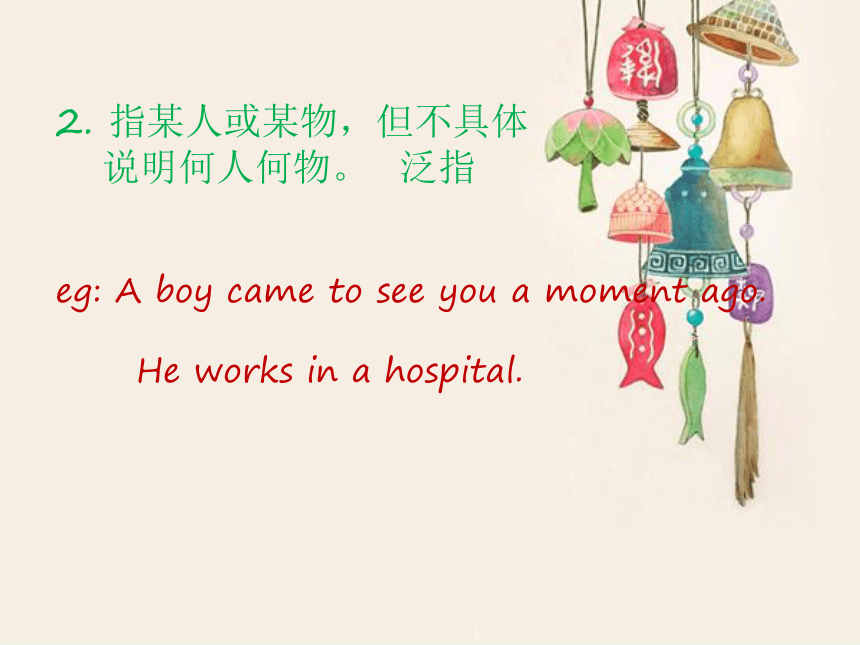
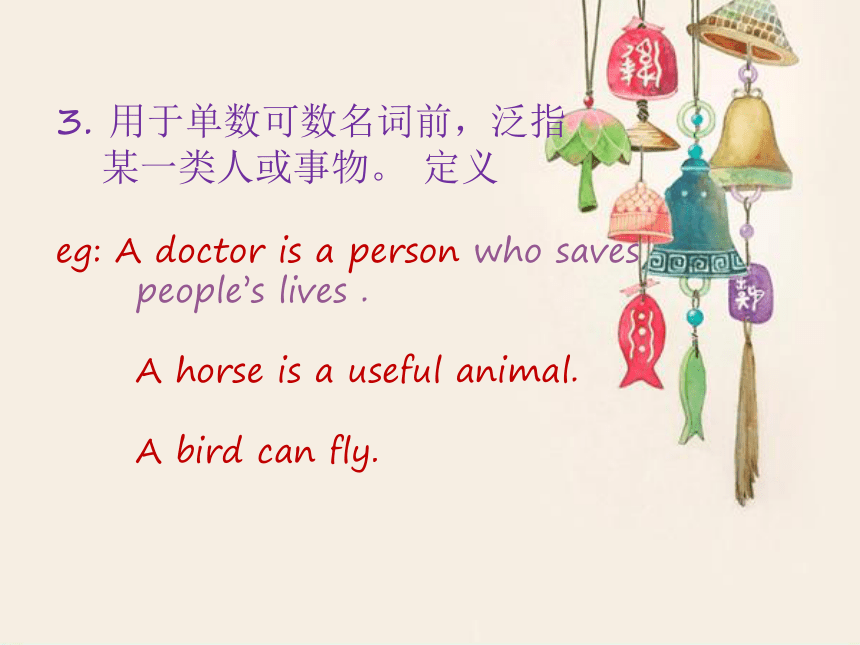
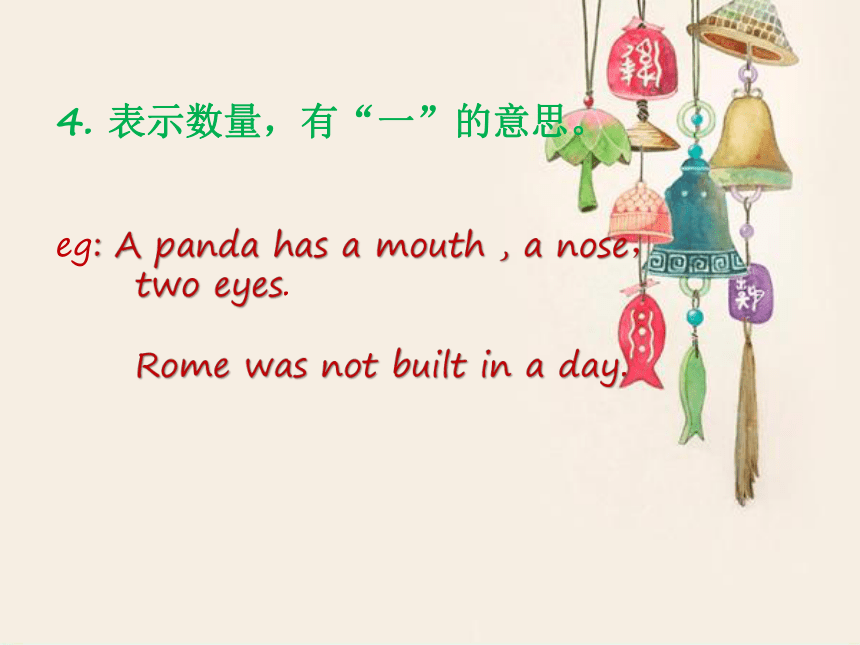
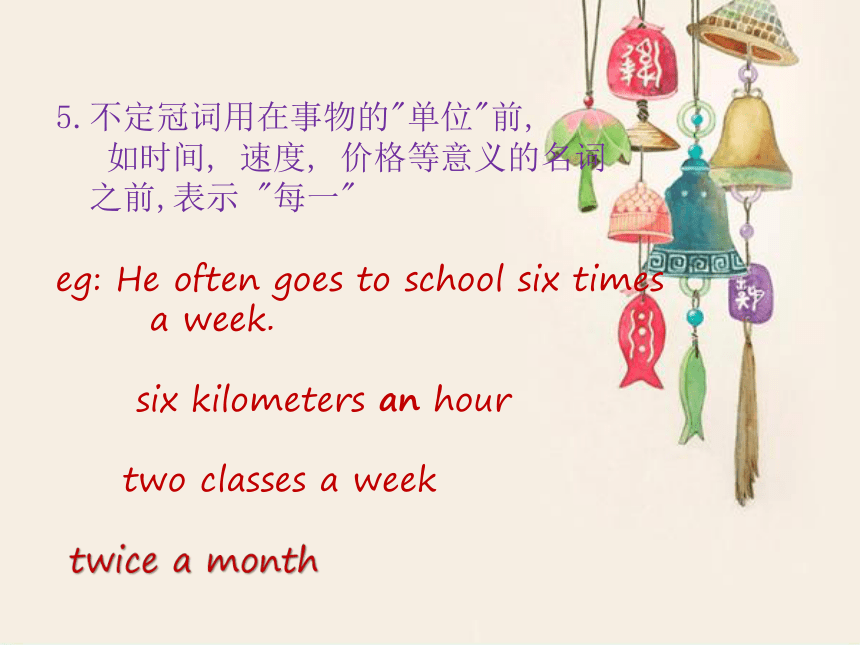
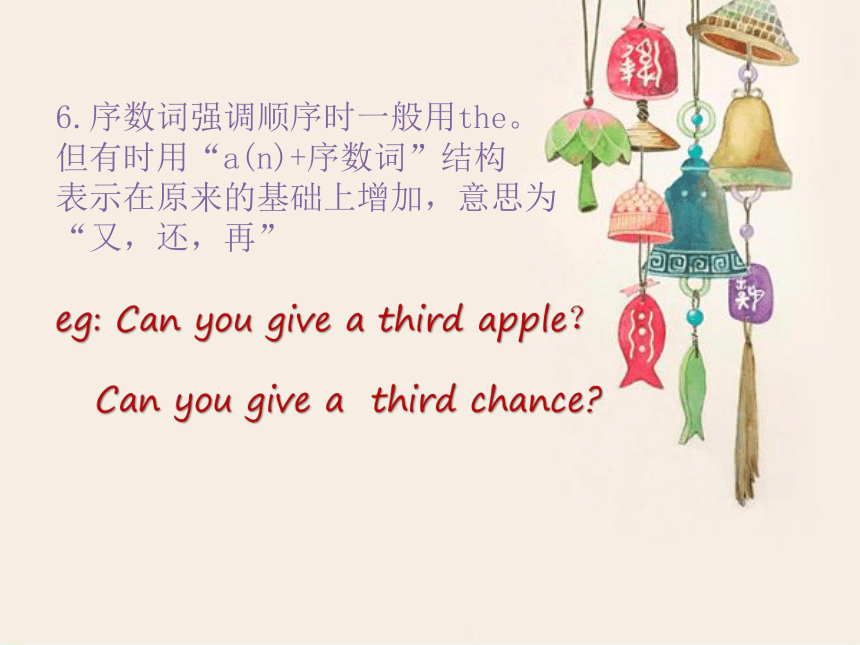
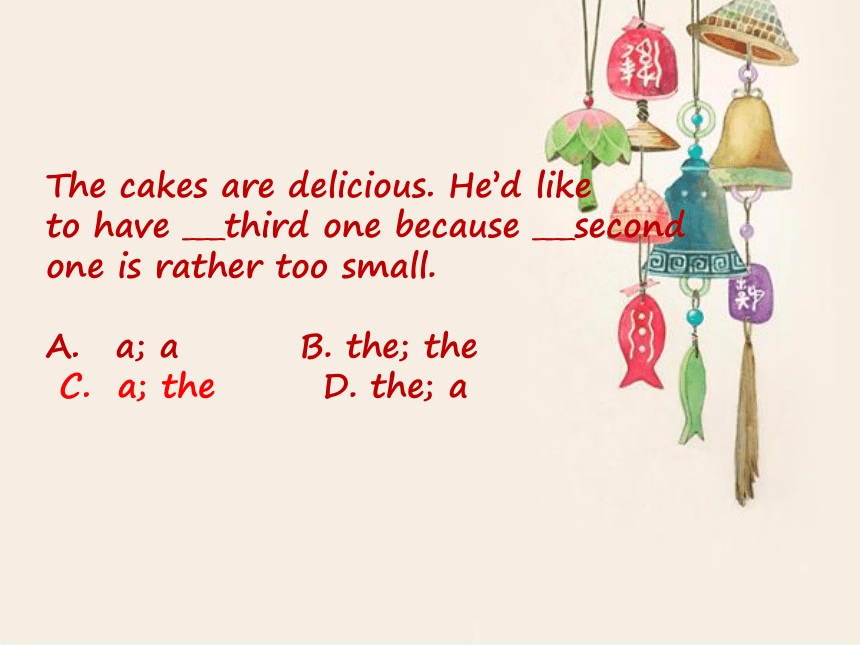
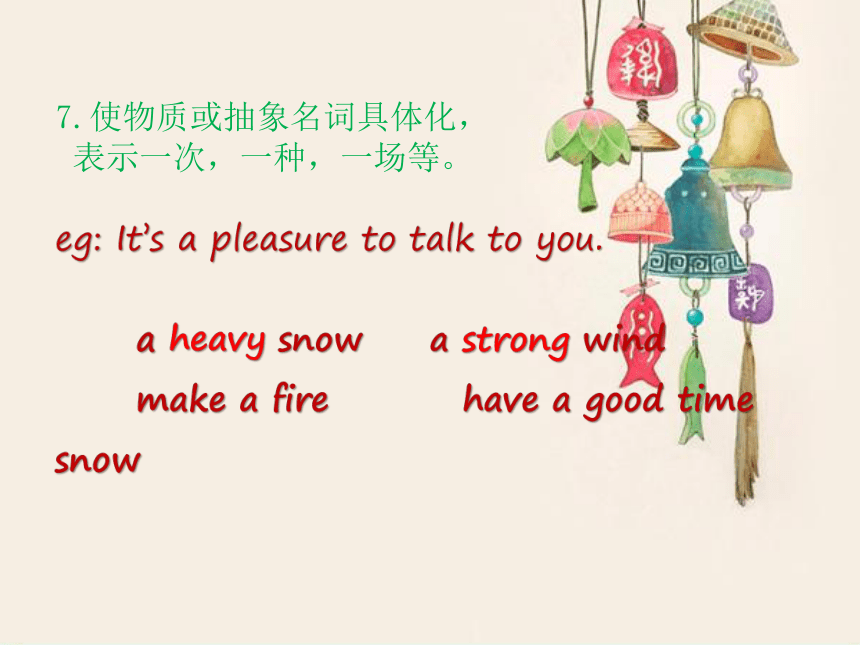
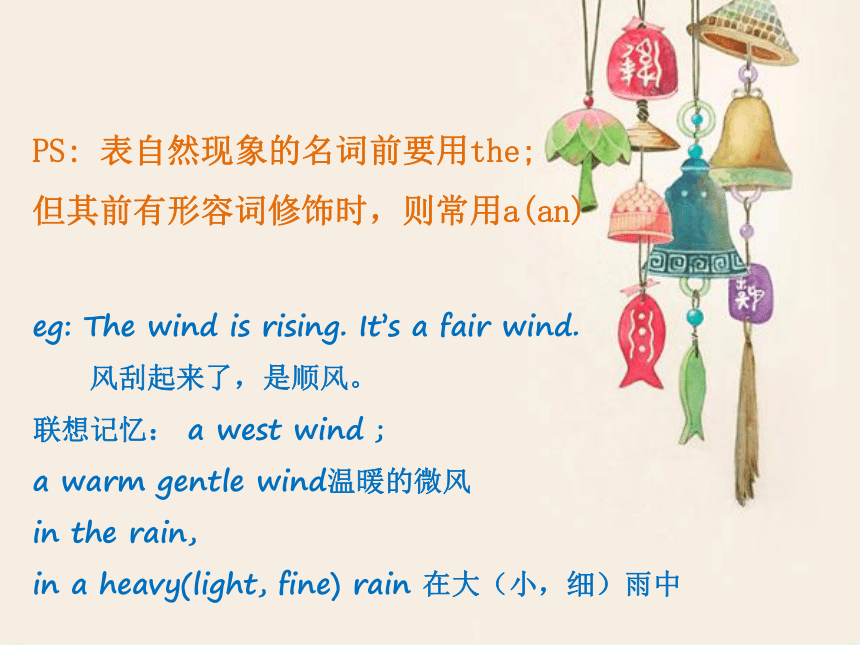
文档简介
课件49张PPT。冠
词 不定冠词
(a、an 泛指) 定冠词
(the 特指)零冠词
I took a pear and an apple from the plate.
辨析不定冠词a/an 的区别
a用在以辅音因素开头的单词前;
an用在以元音音素开头的单词前。
a university in Asia
[ju] 元音音标 还是 辅音 音标呢?
a one-window hall
[w]
an unfinished task
26个字母
an honest boy
There is ____ “i” in the word “university”
一、不定冠词的用法
1.当第一次提到某人或某物时,
用a/an起介绍作用。
eg: There is a tree in front of my house.
I gave him a book yesterday.?
2. 指某人或某物,但不具体
说明何人何物。 泛指
eg: A boy came to see you a moment ago.
He works in a hospital.
3. 用于单数可数名词前,泛指
某一类人或事物。 定义
eg: A doctor is a person who saves
people’s lives .
A horse is a useful animal.
A bird can fly.
4. 表示数量,有“一”的意思。
eg: A panda has a mouth , a nose,
two eyes.
Rome was not built in a day.
5.不定冠词用在事物的"单位"前,
如时间, 速度, 价格等意义的名词
之前,表示 "每一"
eg: He often goes to school six times
a week.
six kilometers?an?hour
two classes a week
twice a month
6.序数词强调顺序时一般用the。
但有时用“a(n)+序数词”结构
表示在原来的基础上增加,意思为
“又,还,再”
eg: Can you give a third apple?
Can you give a third chance?
The cakes are delicious. He’d like
to have ___third one because ___second
one is rather too small.
a; a B. the; the
C. a; the D. the; a
7.使物质或抽象名词具体化,
表示一次,一种,一场等。
eg: It’s a pleasure to talk to you.
a heavy snow a strong wind
make a fire have a good time
snowPS: 表自然现象的名词前要用the;
但其前有形容词修饰时,则常用a(an)
eg: The wind is rising. It’s a fair wind.
风刮起来了,是顺风。
联想记忆: a west wind ;
a warm gentle wind温暖的微风
in the rain,
in a heavy(light, fine) rain 在大(小,细)雨中7.用在固定词组当中。
a bit 一点 a few
a lot (of) a little
have a cold in a hurry
once upon a time make a face
after a while in a word 总的来说
a number of a pair of
“have/take +a+抽象名词”与该名词的动词同意
have a swim have a walk
have a look have a talk补充:
1. 只能修饰 不可数名词 [U]
a great deal of
a large amount of , a bit of 一点
a great / large amount of
2. 只能修饰 可数名词[C]
复数:a good / great many
a (great / large) number of, numbers of
单数: many a 许多
3.既能修饰可数名词复数又能修饰不可数名词
a lot of, lots of, plenty of, a great / large quantity of , quantities of , a great mass of,
masses ofExercise:
元音发音开头字母
a, e, f, h, i, l, m, n, o, r, s, x
a an
1 There is __an__ “m” in the word “mother”.
2. This is __an__ empty bottle . Could you give me __a___ full one?
3. --Did you see the football match last night?
--Yes, I’ve never seen such __an_____ exciting match before.
such an exciting match so exciting a match
such 名词 so 形容词 Exercise:
1. English is useful language . We should
learn it well .
A. a B. an C. the D. /
2. —Are you ________ Chinese or American?
—Chinese. But I was brought up in New York.
A. an B. / C. the D. one
Exercise:
3. I found ____ good news in ____ newspaper.
A. a, a B. a piece of , a piece of
C. a, a piece of D. a piece of , a
4. It’s _____ pity that you are wrong again.
A. / B. a C. an D. the 点击添加文本点击添加文本点击添加文本点击添加文本定冠词 (the)特指
1.用以特指某(些)人或某(些)事物.
eg: This is the house where Luxun once
lived.
限制性定语从句点击添加文本点击添加文本点击添加文本点击添加文本2. 用于指谈话双方都明确所指的人或事物.
eg: Please close?the?door.
Take the medicine.点击添加文本点击添加文本点击添加文本点击添加文本
3.指上文提到过的人或物,
用定冠词the.
eg: I took a pear and an apple
from the plate, and the apple
tasted nice.
点击添加文本点击添加文本点击添加文本点击添加文本Exercise:
1、Would you please pass me
_____ sugar on the table ?
a B. the
C. an D. /
点击添加文本点击添加文本点击添加文本点击添加文本Exercise:
2、Last Sunday , my parents took
me to the zoo . In the zoo I saw
elephant . elephant
was from Africa .
an ; the B. the ; an
C. an ; / D. a ; a
点击添加文本点击添加文本点击添加文本点击添加文本
4. ?the加单数可数名词
可以表示一类人或事物。
eg: The horse is a useful
animal.
A horse is a useful animal.
点击添加文本点击添加文本点击添加文本点击添加文本5.用在形容词的比较级前。
eg: She is the thinner of
the two girls.
越…..越……
比较级 The more you practise,
比较级 the easier it becomes.
点击添加文本点击添加文本点击添加文本点击添加文本
It is believed that ____you work, ____result you’ll get.
the harder; the better
the more hard; the most better
the harder; a better
more hard; more better
点击添加文本点击添加文本点击添加文本点击添加文本
6.用在序数词和形容词最高级前.
eg:July is the seventh
month of the year.
You’re the youngest
in the class.
三者或三者以上
点击添加文本点击添加文本点击添加文本点击添加文本
7.指世界上独一无二的事物.
eg: the sun
the earth
the sky
the world
点击添加文本点击添加文本点击添加文本点击添加文本
8.用在普通名词构成的
专有名词前.
eg: the West Lake
the Great Wall
the United States
the United Nations
1.人名 2.地名或地理名称
3.星期 月份节日 4.团体机构 学校 医院 公共建筑 5,江河 湖泊 海洋 森林
the Great Wall Beijing
the East Street Hospital点击添加文本点击添加文本点击添加文本点击添加文本Exercise:
3、 sun is shining brightly .
A. a B. the C. an D. /
4、 Great Wall is famous in world .
A. a ; a B. the ; the
C. a ; the D. the ; a点击添加文本点击添加文本点击添加文本点击添加文本
9.用在某些形容词前,
使形容词名词化,
代表一类人或物。
eg: the rich 富人
the poor 穷人
the sick 病人
the blind 盲人
the good 好人点击添加文本点击添加文本点击添加文本点击添加文本
10.用在姓氏复数前,表示
“全家人”或“夫妇俩”。
eg: The Greens are having
dinner at home.
The Bakers come to see
them.
点击添加文本点击添加文本点击添加文本点击添加文本
11.用在西洋乐器前。
eg:play the piano
play the violin
play _the_ flute
play Erhu
Play Pipa
Play Guzheng
点击添加文本点击添加文本点击添加文本点击添加文本
12.在江河、海洋、山脉、群岛、
海峡、海湾、沙漠等专有名词前
加the 。
the Pacific Ocean太平洋
the Huanghe River 黄河
the Yangtze River 长江 扬子江
the Himalayas 喜马拉雅山脉
the Sahara Desert 撒哈拉沙漠
the English Channel 英吉利海峡
点击添加文本点击添加文本点击添加文本点击添加文本
PS: 海岛 山峰 湖泊 等名称前
一般不用the.
Taiwan island台湾岛
Mount Jolmo Lungma 珠穆朗玛峰
Lake Michigan 密歇根湖
点击添加文本点击添加文本点击添加文本点击添加文本
13. 定冠词加在表示单位的名词
前,意为“每…,按…”的意思
I rented the house by the month.
Pencils are sold by the dozen.
铅笔按打来卖的。点击添加文本点击添加文本点击添加文本点击添加文本
As a rule, the workers are paid______.
by the hour B. by hour
C. by an hour D. by hours
PS: 在by weight(按重量)
中不用the点击添加文本点击添加文本点击添加文本点击添加文本
14.固定搭配当中的定冠词。
in the morning/afternoon/evening
in the end
at the same time
all the year round 全年
in the east/ south/west/north
in the front of在…前面 in the future 在未来
at the back of 在…后面 play the fool 做傻事
on the spot 在现场 当场
out of the question 不可能
out of question 没问题点击添加文本点击添加文本点击添加文本点击添加文本巧学妙记
特指、重提和唯一,沙漠、江河与群山
海洋、党派、最高级,群岛、海峡和海湾
方位、顺序和西乐, 年代、团体与机关
组织、船名和建筑, 会议、条约与报纸
姓氏复数、国全名,望请记住用定冠点击添加文本点击添加文本点击添加文本点击添加文本Exercise:
5、 Greens are on a visit to a beautiful city
in ______ China .
A. a ; a B. the ; the C. a ; the D. The ; /
6、She learned to play guitar all by herself .
A. a B. the C. an D. /
零冠词某些专有名词,物质名词,抽象名词等表示泛指时前面用零冠词。
名词 专有名词 5种 和普通名词 (个体,集体,物质,抽象)
eg:
Money is not everything.
Sugar is not good for children.
How time flies!
Wisdom is better than strength.
Can you pass _the__ sugar to me ? 特指2. 不可数名词和复数名词表泛指时前面用零冠词。
eg: Man can’t live without air.
Water is colorless.
Horses are useful animals.
A horse is a useful animal.
The horse is a useful animal.
3. 当名词前已有不定代词或者指示代词、物主代词及名词所有格等修饰时,不必加冠词。
eg: This article you have written
is very wonderful.
Every student likes English
in our class.
不定代词: each
指示代词: this that these those
物主代词: my your her his
名词所有格: Rachel’s 4. 在节日、假日、星期、月份、
季节等名词前不用加冠词。
eg: on Monday
on January
In Autumn
on National Day
PS: 中国有的传统节日
前常加the
the Spring Festival 春节
the Lantern Festival 元宵节
the Mid-Autumn Festival 中秋节
节日:
1月1日 新年 New Year’s Day
2月14日 情人节 St. Valentine’s Day
3月8日 妇女节 Women’s Day
4月1日 愚人节 April Fool’s Day
5月1日 劳动节 Labor Day
5月的第二个周日 母亲节 Mother’s Day
6月1日 儿童节 Children’s Day
6月的第三个周日 父亲节 Father’s Day
9月10日 教师节 Teachers’ Day
10月1日 国庆节 National Day
1O月31日 万圣节 Halloween
12月25日 圣诞节 Christmas Day
农历正月初一 春节 Spring Festival
Chinese New Year
农历正月十五 元宵节 Lantern Festival
农历五月初五 端午节 Dragon Boat Festival
农历八月十五 中秋节 Mid-Autumn Day
农历大年三十 除夕 New Year’s Eve
5. 在一日三餐、体育类等名词前不加冠词。
breakfast lunch supper dinner
eg: I cooked some noodles
for supper.
The old are playing chess
under the tree.
He likes playing basketball
and football.
西洋乐器 the
东方乐器 play Erhu
6. 在表示职务、头衔、称呼等名词前不加冠词。
eg: Professor Li just came back
from New Zealand.
Mr. Smith likes tennis.
He is elected manager of
our company.
7. 与by连用的交通工具名词前用零冠词。
eg: by plane
by bus
by boat
by bike
on foot
8. 在一些固定词组中不加冠词
at home 在家 at last 最后 at once 马上 at noon 在中午 at night 在晚上 at first 最初
at work 在工作 by mistake 出错
year after year 一年又一年 day and night 日日夜夜
in sight 看见 in surprise 惊奇地
on foot 走路 on holiday 在度假 on time 准时
on business 经商 go home 回家 in time 及时
To one’s surprise 令人惊讶的是
辨析 有定冠词和无定冠词的区别
引申
go to school 上学 go to the school 到学校去
go to bed 睡觉 go to the bed 到床边
in hospital 生病住院 in the hospital 在医院
at table 吃饭 at the table 在桌旁
at school 在上学 at the school 在学校
in class 在上课 in the class 在班级里面
in bed (躺)在床 in the bed (某物)在床上
in front of 在前面(外部) in the front of 在前面 (内部)
next year 明年 the next year 第二年
by sea 乘船 by the sea 在海边
on earth究竟,到底 on the earth 在地球上
词 不定冠词
(a、an 泛指) 定冠词
(the 特指)零冠词
I took a pear and an apple from the plate.
辨析不定冠词a/an 的区别
a用在以辅音因素开头的单词前;
an用在以元音音素开头的单词前。
a university in Asia
[ju] 元音音标 还是 辅音 音标呢?
a one-window hall
[w]
an unfinished task
26个字母
an honest boy
There is ____ “i” in the word “university”
一、不定冠词的用法
1.当第一次提到某人或某物时,
用a/an起介绍作用。
eg: There is a tree in front of my house.
I gave him a book yesterday.?
2. 指某人或某物,但不具体
说明何人何物。 泛指
eg: A boy came to see you a moment ago.
He works in a hospital.
3. 用于单数可数名词前,泛指
某一类人或事物。 定义
eg: A doctor is a person who saves
people’s lives .
A horse is a useful animal.
A bird can fly.
4. 表示数量,有“一”的意思。
eg: A panda has a mouth , a nose,
two eyes.
Rome was not built in a day.
5.不定冠词用在事物的"单位"前,
如时间, 速度, 价格等意义的名词
之前,表示 "每一"
eg: He often goes to school six times
a week.
six kilometers?an?hour
two classes a week
twice a month
6.序数词强调顺序时一般用the。
但有时用“a(n)+序数词”结构
表示在原来的基础上增加,意思为
“又,还,再”
eg: Can you give a third apple?
Can you give a third chance?
The cakes are delicious. He’d like
to have ___third one because ___second
one is rather too small.
a; a B. the; the
C. a; the D. the; a
7.使物质或抽象名词具体化,
表示一次,一种,一场等。
eg: It’s a pleasure to talk to you.
a heavy snow a strong wind
make a fire have a good time
snowPS: 表自然现象的名词前要用the;
但其前有形容词修饰时,则常用a(an)
eg: The wind is rising. It’s a fair wind.
风刮起来了,是顺风。
联想记忆: a west wind ;
a warm gentle wind温暖的微风
in the rain,
in a heavy(light, fine) rain 在大(小,细)雨中7.用在固定词组当中。
a bit 一点 a few
a lot (of) a little
have a cold in a hurry
once upon a time make a face
after a while in a word 总的来说
a number of a pair of
“have/take +a+抽象名词”与该名词的动词同意
have a swim have a walk
have a look have a talk补充:
1. 只能修饰 不可数名词 [U]
a great deal of
a large amount of , a bit of 一点
a great / large amount of
2. 只能修饰 可数名词[C]
复数:a good / great many
a (great / large) number of, numbers of
单数: many a 许多
3.既能修饰可数名词复数又能修饰不可数名词
a lot of, lots of, plenty of, a great / large quantity of , quantities of , a great mass of,
masses ofExercise:
元音发音开头字母
a, e, f, h, i, l, m, n, o, r, s, x
a an
1 There is __an__ “m” in the word “mother”.
2. This is __an__ empty bottle . Could you give me __a___ full one?
3. --Did you see the football match last night?
--Yes, I’ve never seen such __an_____ exciting match before.
such an exciting match so exciting a match
such 名词 so 形容词 Exercise:
1. English is useful language . We should
learn it well .
A. a B. an C. the D. /
2. —Are you ________ Chinese or American?
—Chinese. But I was brought up in New York.
A. an B. / C. the D. one
Exercise:
3. I found ____ good news in ____ newspaper.
A. a, a B. a piece of , a piece of
C. a, a piece of D. a piece of , a
4. It’s _____ pity that you are wrong again.
A. / B. a C. an D. the 点击添加文本点击添加文本点击添加文本点击添加文本定冠词 (the)特指
1.用以特指某(些)人或某(些)事物.
eg: This is the house where Luxun once
lived.
限制性定语从句点击添加文本点击添加文本点击添加文本点击添加文本2. 用于指谈话双方都明确所指的人或事物.
eg: Please close?the?door.
Take the medicine.点击添加文本点击添加文本点击添加文本点击添加文本
3.指上文提到过的人或物,
用定冠词the.
eg: I took a pear and an apple
from the plate, and the apple
tasted nice.
点击添加文本点击添加文本点击添加文本点击添加文本Exercise:
1、Would you please pass me
_____ sugar on the table ?
a B. the
C. an D. /
点击添加文本点击添加文本点击添加文本点击添加文本Exercise:
2、Last Sunday , my parents took
me to the zoo . In the zoo I saw
elephant . elephant
was from Africa .
an ; the B. the ; an
C. an ; / D. a ; a
点击添加文本点击添加文本点击添加文本点击添加文本
4. ?the加单数可数名词
可以表示一类人或事物。
eg: The horse is a useful
animal.
A horse is a useful animal.
点击添加文本点击添加文本点击添加文本点击添加文本5.用在形容词的比较级前。
eg: She is the thinner of
the two girls.
越…..越……
比较级 The more you practise,
比较级 the easier it becomes.
点击添加文本点击添加文本点击添加文本点击添加文本
It is believed that ____you work, ____result you’ll get.
the harder; the better
the more hard; the most better
the harder; a better
more hard; more better
点击添加文本点击添加文本点击添加文本点击添加文本
6.用在序数词和形容词最高级前.
eg:July is the seventh
month of the year.
You’re the youngest
in the class.
三者或三者以上
点击添加文本点击添加文本点击添加文本点击添加文本
7.指世界上独一无二的事物.
eg: the sun
the earth
the sky
the world
点击添加文本点击添加文本点击添加文本点击添加文本
8.用在普通名词构成的
专有名词前.
eg: the West Lake
the Great Wall
the United States
the United Nations
1.人名 2.地名或地理名称
3.星期 月份节日 4.团体机构 学校 医院 公共建筑 5,江河 湖泊 海洋 森林
the Great Wall Beijing
the East Street Hospital点击添加文本点击添加文本点击添加文本点击添加文本Exercise:
3、 sun is shining brightly .
A. a B. the C. an D. /
4、 Great Wall is famous in world .
A. a ; a B. the ; the
C. a ; the D. the ; a点击添加文本点击添加文本点击添加文本点击添加文本
9.用在某些形容词前,
使形容词名词化,
代表一类人或物。
eg: the rich 富人
the poor 穷人
the sick 病人
the blind 盲人
the good 好人点击添加文本点击添加文本点击添加文本点击添加文本
10.用在姓氏复数前,表示
“全家人”或“夫妇俩”。
eg: The Greens are having
dinner at home.
The Bakers come to see
them.
点击添加文本点击添加文本点击添加文本点击添加文本
11.用在西洋乐器前。
eg:play the piano
play the violin
play _the_ flute
play Erhu
Play Pipa
Play Guzheng
点击添加文本点击添加文本点击添加文本点击添加文本
12.在江河、海洋、山脉、群岛、
海峡、海湾、沙漠等专有名词前
加the 。
the Pacific Ocean太平洋
the Huanghe River 黄河
the Yangtze River 长江 扬子江
the Himalayas 喜马拉雅山脉
the Sahara Desert 撒哈拉沙漠
the English Channel 英吉利海峡
点击添加文本点击添加文本点击添加文本点击添加文本
PS: 海岛 山峰 湖泊 等名称前
一般不用the.
Taiwan island台湾岛
Mount Jolmo Lungma 珠穆朗玛峰
Lake Michigan 密歇根湖
点击添加文本点击添加文本点击添加文本点击添加文本
13. 定冠词加在表示单位的名词
前,意为“每…,按…”的意思
I rented the house by the month.
Pencils are sold by the dozen.
铅笔按打来卖的。点击添加文本点击添加文本点击添加文本点击添加文本
As a rule, the workers are paid______.
by the hour B. by hour
C. by an hour D. by hours
PS: 在by weight(按重量)
中不用the点击添加文本点击添加文本点击添加文本点击添加文本
14.固定搭配当中的定冠词。
in the morning/afternoon/evening
in the end
at the same time
all the year round 全年
in the east/ south/west/north
in the front of在…前面 in the future 在未来
at the back of 在…后面 play the fool 做傻事
on the spot 在现场 当场
out of the question 不可能
out of question 没问题点击添加文本点击添加文本点击添加文本点击添加文本巧学妙记
特指、重提和唯一,沙漠、江河与群山
海洋、党派、最高级,群岛、海峡和海湾
方位、顺序和西乐, 年代、团体与机关
组织、船名和建筑, 会议、条约与报纸
姓氏复数、国全名,望请记住用定冠点击添加文本点击添加文本点击添加文本点击添加文本Exercise:
5、 Greens are on a visit to a beautiful city
in ______ China .
A. a ; a B. the ; the C. a ; the D. The ; /
6、She learned to play guitar all by herself .
A. a B. the C. an D. /
零冠词某些专有名词,物质名词,抽象名词等表示泛指时前面用零冠词。
名词 专有名词 5种 和普通名词 (个体,集体,物质,抽象)
eg:
Money is not everything.
Sugar is not good for children.
How time flies!
Wisdom is better than strength.
Can you pass _the__ sugar to me ? 特指2. 不可数名词和复数名词表泛指时前面用零冠词。
eg: Man can’t live without air.
Water is colorless.
Horses are useful animals.
A horse is a useful animal.
The horse is a useful animal.
3. 当名词前已有不定代词或者指示代词、物主代词及名词所有格等修饰时,不必加冠词。
eg: This article you have written
is very wonderful.
Every student likes English
in our class.
不定代词: each
指示代词: this that these those
物主代词: my your her his
名词所有格: Rachel’s 4. 在节日、假日、星期、月份、
季节等名词前不用加冠词。
eg: on Monday
on January
In Autumn
on National Day
PS: 中国有的传统节日
前常加the
the Spring Festival 春节
the Lantern Festival 元宵节
the Mid-Autumn Festival 中秋节
节日:
1月1日 新年 New Year’s Day
2月14日 情人节 St. Valentine’s Day
3月8日 妇女节 Women’s Day
4月1日 愚人节 April Fool’s Day
5月1日 劳动节 Labor Day
5月的第二个周日 母亲节 Mother’s Day
6月1日 儿童节 Children’s Day
6月的第三个周日 父亲节 Father’s Day
9月10日 教师节 Teachers’ Day
10月1日 国庆节 National Day
1O月31日 万圣节 Halloween
12月25日 圣诞节 Christmas Day
农历正月初一 春节 Spring Festival
Chinese New Year
农历正月十五 元宵节 Lantern Festival
农历五月初五 端午节 Dragon Boat Festival
农历八月十五 中秋节 Mid-Autumn Day
农历大年三十 除夕 New Year’s Eve
5. 在一日三餐、体育类等名词前不加冠词。
breakfast lunch supper dinner
eg: I cooked some noodles
for supper.
The old are playing chess
under the tree.
He likes playing basketball
and football.
西洋乐器 the
东方乐器 play Erhu
6. 在表示职务、头衔、称呼等名词前不加冠词。
eg: Professor Li just came back
from New Zealand.
Mr. Smith likes tennis.
He is elected manager of
our company.
7. 与by连用的交通工具名词前用零冠词。
eg: by plane
by bus
by boat
by bike
on foot
8. 在一些固定词组中不加冠词
at home 在家 at last 最后 at once 马上 at noon 在中午 at night 在晚上 at first 最初
at work 在工作 by mistake 出错
year after year 一年又一年 day and night 日日夜夜
in sight 看见 in surprise 惊奇地
on foot 走路 on holiday 在度假 on time 准时
on business 经商 go home 回家 in time 及时
To one’s surprise 令人惊讶的是
辨析 有定冠词和无定冠词的区别
引申
go to school 上学 go to the school 到学校去
go to bed 睡觉 go to the bed 到床边
in hospital 生病住院 in the hospital 在医院
at table 吃饭 at the table 在桌旁
at school 在上学 at the school 在学校
in class 在上课 in the class 在班级里面
in bed (躺)在床 in the bed (某物)在床上
in front of 在前面(外部) in the front of 在前面 (内部)
next year 明年 the next year 第二年
by sea 乘船 by the sea 在海边
on earth究竟,到底 on the earth 在地球上
同课章节目录
- 词法
- 名词
- 动词和动词短语
- 动词语态
- 动词时态
- 助动词和情态动词
- 非谓语动词
- 冠词
- 代词
- 数词和量词
- 形容词副词及其比较等级
- 介词和介词短语
- 连词和感叹词
- 构词法
- 相似、相近词比较
- 句法
- 陈述句
- 一般疑问句和否定疑问句
- 特殊疑问句及选择疑问句
- 反意疑问句
- 存在句(There be句型)
- 宾语从句
- 定语从句
- 状语从句
- 主谓一致问题
- 简单句
- 并列句
- 复合句
- 主谓一致
- 主、表语从句
- 名词性从句
- 直接引语和间接引语
- 虚拟语气
- 感叹句
- 强调句
- 倒装句
- 祈使句
- 句子的成分
- 句子的分类
- 题型专区
- 单项选择部分
- 易错题
- 完形填空
- 阅读理解
- 词汇练习
- 听说训练
- 句型转换
- 补全对话
- 短文改错
- 翻译
- 书面表达
- 任务型阅读
- 语法填空
- 其他资料
